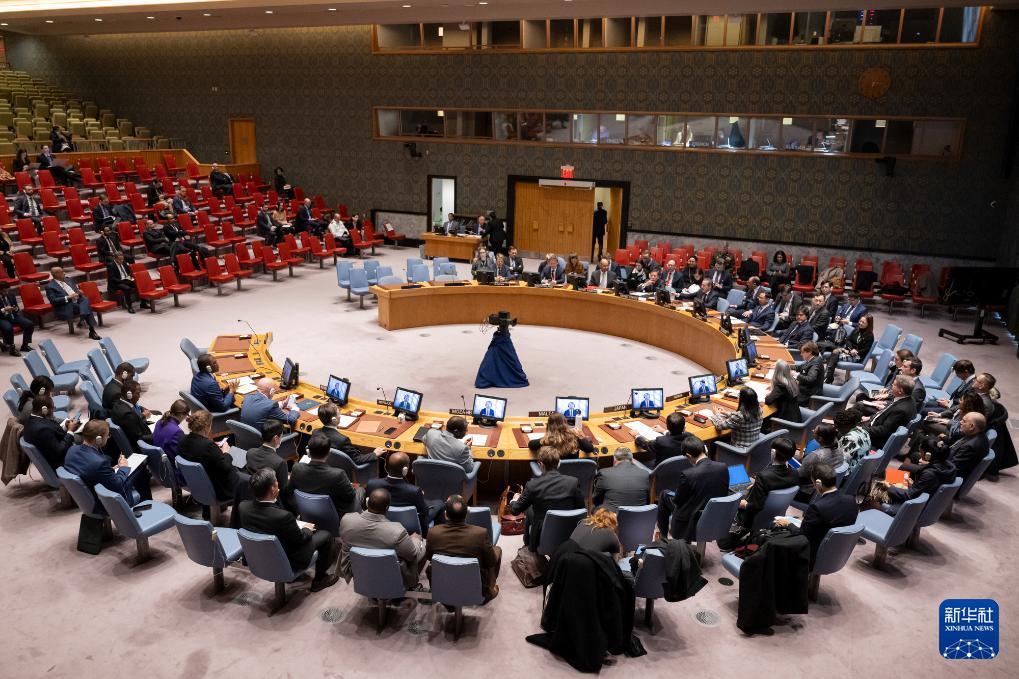
The UN Security Council holds an emergency open meeting on the Red Sea situation at the UN headquarters on January 3, 2024.
By Shu Meng
The Red Sea has witnessed persistent tensions and increasingly volatile crises recently. Since mid-November last year, Yemen Houthi armed forces have launched more than 20 attacks on the passing ships off the waters, significantly impacting regional stability, navigation traffic, and global supply chains. In the wake of the Gaza conflict, the Red Sea situation has become a focus of regional geopolitical disputes.
In recent years, the Red Sea region has garnered growing attention from the Gulf countries as they strive to create strategic anchor points in Djibouti, Eritrea, and other nations along the coastal line. Given its geographically sensitive and vital location, the situation of the Red Sea is closely related to the stability of the international economic and global trade. Consequently, this has led to increased interest from extraterritorial major powers, whose involvement and intervention have further complicated the regional situation.
Amid the stressful situation in the Red Sea, the regional crises have escalated into global security threats that have caused significant disruptions to international shipping and global supply chain security. To mitigate the risks in the region, some shipping companies have to hire armed guards at high prices, resulting in a nearly twofold surge in war risk premiums for shipping in the Red Sea. Certain shipping companies choose to bypass the Cape of Good Hope at the southern tip of Africa, further increasing the shipping costs and triggering global supply chain risks. Under these circumstances, it is imperative to cool down the regional situation.
But judging from the developments of the current situation, it is particularly challenging to resolve the Red Sea crisis.
First, the Red Sea security issue has become a crucial leverage for the Houthi armed forces to achieve outsized results. As the Yemen issue has been dragging on, the Houthis have taken various actions to enhance their legitimacy and influence within and outside the country and put pressure on Israel by relying on their geographical advantage in the Bab el-Mandeb Strait. Until the political settlement of the Yemen issue, the Houthis are not likely to significantly change this strategy. Second, countries surrounding the Red Sea face constant non-traditional security threats. The repeated and never-ending smuggling and human trafficking as well as the resurgence of terrorism and piracy in the Red Sea have exacerbated the complexity of the regional security situation.
More importantly, the Red Sea region has become the most prominent spillover area of the Israeli-Palestinian conflict. As the conflict progresses, the confrontation between Israel and Hamas is transforming into conflicts between the two blocs, and the Red Sea region has become an important battlefield between the US and Israel camp and the resistance camp led by Iran. In the recent series of international incidents, the region has seen contradictions between the two sides further deepening and tensions and militarization tendency aggravating. In the coming period of time, the haze of the standoff between the two major factions will primarily loom over the Red Sea region, while the linkage between regional security and the Israeli-Palestinian issue will become more pronounced, and the Israeli-Palestinian contradictions will continue to be key factor for additional conflicts and disputes in the region.
Repressing violence with force will only prove counterproductive for the permanent settlement of the Red Sea crisis. In response to Houthi's attacks in the Red Sea region, the US formed a multinational maritime coalition to carry out the "Operation Prosperity Guardian" escorts. However, this operation failed to effectively deter Houthi, and the forces can still attack passing ships by breaching the escort security measures of the US. This has led to concerns about the safety of the shipping routes of the sea among vessel owners unrelated to Israel, further uplifting shipping costs, aggravating the contradictions and exacerbating the already tense atmosphere in the region. Furthermore, the convoy coalition formed by the US faces legitimacy deficits due to the absence of engagement from Middle Eastern countries. The political process in Yemen will become increasingly difficult to advance once accidental conflicts are sparked in the region.
Therefore, dialogue and negotiation offer an enduring solution to the Red Sea crisis, which should be implemented based on two principles. For one thing, the international community should work together to promote the political settlement of the Israeli-Palestinian issue. The current Red Sea situation is one of the manifestations of the spillover effect of the Gaza conflict. Should the appeals of Palestine continue to be ignored and marginalized, these spillover events will proliferate in various other locations. For another, in respect of other regional issues including the Iranian nuclear issue and the Yemen issue, seeking political solutions should be the foremost priority for the whole society.
The long-standing existence of some hotspot issues in the Middle East and their spillover effects have demonstrated that repressing violence with force and overlooking the demands of parties concerned hinder the resolution of these problems. Merely easing the crises does not address the root cause, whereas upholding dialogue and negotiation and advancing political resolution are the fundamental and correct paths.
(The author is from the Middle East Studies Institute of Shanghai International Studies University.)
Editor's note: Originally published on china.com.cn, this article is translated from Chinese into English and edited by the China Military Online. The information and opinions in this article do not necessarily reflect the views of eng.chinamil.com.cn.













